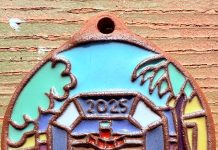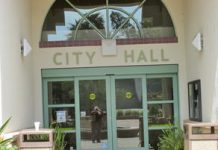A slide depicting a forecast of days with “cash on hand” showed the local hospital’s cash decreasing until June.
Jason Paret, CEO of Catalina Island Health, told the Avalon City Council on Tuesday, Jan. 9, that he might be able to hang on until June.
Paret said he was not asking the city for money.
During the meeting, Paret said closing the hospital is not an option. He called for special legislation for Avalon and proposed become part of the UC hospital system.
Paret said Avalon’s hospital has never had a serious bank account. “The model that we are operating with is not going to sustain this organization for perpetuity like it should,” he said.
“We need to change,” Paret said.
Paret cited increases in the costs per patient, in maintenance costs, and inflation as the reason that costs are rising. He said the hospital had pipes with saltwater going through them that like to burst. He said it was hard to get people to maintain hospital technology on an Island.
He said costs were going up. He said reserves are going down.
Paret described the hospital payment system as “beyond complex.” According to the Catalina Island Health website, he has more than 25 years’ experience in health care.
Paret said other hospitals get reimbursed more than Catalina Island Health does.
“Some states make substantial payments to providers above what they pay for individual services through Medicaid rates. These additional payments fall into two categories: disproportionate share hospital (DSH) payments, which help offset hospital uncompensated care costs, and UPL (upper payment limit) supplemental payments, which are intended to make the difference between fee-for-service payments and the amount that Medicare would have paid for the same service,” according to the Medicaid and CHIP Payment and Access Commission website.
Referring to supplemental payments, Paret said, “Basically, you need a governmental connection to get these funds.”
“I would argue we get paid less than any hospital in the state of California,” Paret said.
As for options, Paret said the community could do a tax district, but that would require an election. He said he didn’t think that is what Avalon needs, but it would get more money.
“They are predominantly the ones that fail more often than the 501(c)3s,” Paret said.
He said they were working with Assemblymember Joshua Lowenthal on special legislation.
Paret believes the best option is for Avalon to become part of a University of California hospital.
“That would give us all the access to all the supplementals,” Paret said.
Paret asked the community to reach out to the hospital’s board of directors, saying they wanted to hear from the community.
As for closing the hospital, Marshall said, “We can’t let that happen.”
“Seems you should have known about it before you met with me five week’s ago,” said Mayor Anni Marshall.
She said the community wanted to know what had been done to cut expenses.
“Cutting expensis is not the solution,” Paret said.
He said if one individual gets ill, it might be days before you have radiology. He said Avalon should be over staffing radiology.. Much like the Fire Department, he said you have to be prepared for the worst case scenario.
“But in our situation, we don’t,” Paret said.
“We drive old golf carts. We own hone vehicle that is brand new,” he said.
“If you cut salaries we will not have any employees,” Paret said.
“You could start at the top,” said Councilmember Mary Schickling.
That triggered a round of applause from the audience.
“There is information out there that tells us, and people in this room have researched it, how much a CEO of a hospital of comparable size to ours, with the number of hospital beds, pull down a year and you are way beyond,” Schickling said.
“Is this what we’re going to do, make this all about negative—”
“No, no, no, no. We’re talking about cutting all kinds of expenses,” Schickling said.
“I’m telling you, there are not enough costs to cut to make up the difference because inflation is only going to increase,” Paret said.
Councilmember Lisa Lavelle said administrative costs of the hospital needed to be a piece of the puzzle.
Lavelle agreed that joining the University of California hospitals was the direction to go.
She also said it would be wise to look at housing costs, apparently referring to housing for hospital staff.
City Manager David Maistros asked how long it would take to go with a new partner.
“It depends,” Paret said.
He said once you decide to have a partnership, the partner can provide bridge funds.
“I don’t want a patch. I want a fix. THis has been devcades of patch, patch, patch,” Paret siad.
“That doesn’t mean you can’t take a patch to buy us some time,” Paret said.
He said his concern was that if you take a patch you are no longer the most important thinking.
Councilmember Michael Ponce, said that in the 16 years he was on the hospital board, they brought in CEOs. The focus was always to keep the doors open and build a new facility.
Ponce reminded the audience that the state of California has required hospitals to become current with earthquake standards, which means building a new hospital. Ponce said no one had brought them closer to building a new facility than Jason Paret because he has a background in building facilities. “If that hospital goes away, this community will die,” Ponce said.
Ponce said if the hospital closes, it will not be able to oen its doors again until a new facility is built.
He said Avalon needs a new facility and to keep the doors (of the current hospital) open.
“It needs support from us,” he said, gesturing to include the entire City Council.
“We need as an organizatin, to support this organization,” Ponce said.
That triggered another round of applause from the audience.
Lavelle said she agreed with Ponce on the need to support the hospital, but that needed to be educated support. She said she would like to see monthly financial information from the hospital.
Schickling asked if the hospital board was up to speed.
“My board is highly educated on everything that I’ve spoken about,” Paret said.
“It just seems like all of a sudden ti’s a panic,” she said.
“It take a long time to understand how all these things work in the state, Paret.
“The city is fully supportive of trying to fix the problem,” said Maistros.
Later, Schickling told Paret that she was not attacking him.
Resident Jack Sweeney called for an audit of the hospital.
Ponce said an auditor does the hospital’s financials every year.
Marshall requested an update on the construction of the hospital.
One resident asked about a contingency plan
Lavelle said those discussions have started happening. She said it would likely be Los ANgeles County that would step in.
Maistros said there were a lot of scenaries to be looked into if the worst happens.
Paret brought hospital industry advocates with him to his presentation to the council. According to those experts, who spoke at the start of the meeting, hospitals are facing financial issues nationwide.
Peggy Wheeler, vice president on the policy team at the California Hospital Association, said there are 37 hospitals in the state like Avalon’s hospital: critical access hospitals.
According to Wheeler, hospitals are trying to recover from COVID-19. “What we have seen across the board is that hospitals are recovering very slowly,” Wheeler said.
Mark Gamble, chief of advocacy and operations for Hospital Association of Southern Caliornia, said there were a number of hospitals in financial straights.
He said the threat of closures and downsizing was happening not just in small hospitals.











